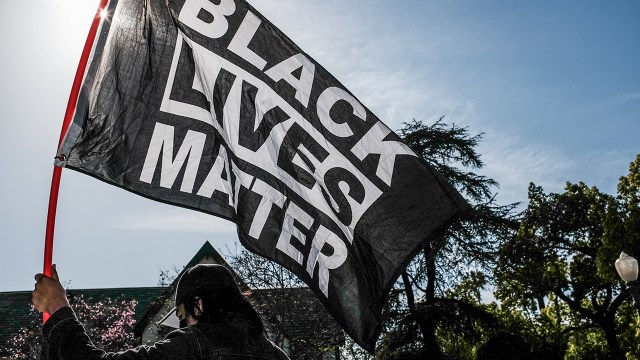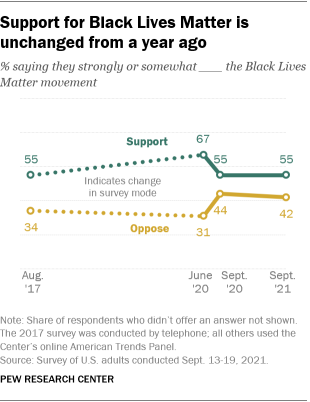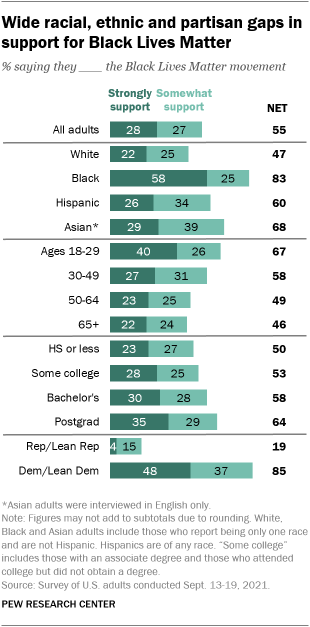
Note: For the latest data on this topic, read our 2022 blog post.
Support for the Black Lives Matter movement, which declined between June and September 2020, has remained stable. Currently, 55% of U.S. adults express at least some support for the movement, unchanged from a year ago, according to a new Pew Research Center survey. In June 2020, amid nationwide demonstrations following the murder of George Floyd, two-thirds of Americans said they strongly or somewhat supported the Black Lives Matter movement.

Support for the Black Lives Matter movement remains particularly widespread among Black Americans: 83% currently express at least some support, with 58% saying they strongly support the movement. Smaller majorities of Asian (68%) and Hispanic (60%) adults also express support, compared with 47% of White adults. About three-in-ten or fewer Asian, Hispanic and White Americans say they strongly support the Black Lives Matter movement.
As was the case a year ago, there is also a large partisan divide in views of the Black Lives Matter movement. More than eight-in-ten Democrats and Democratic-leaning independents (85%) express at least some support, including 48% who strongly support the movement. In contrast, most Republicans and those who lean to the GOP (78%) say they oppose the Black Lives Matter movement, with 58% saying they strongly oppose it.
Pew Research Center conducted this study to understand Americans’ attitudes toward the Black Lives Matter movement and how they might have changed in the past year. The data was collected as part of a larger survey conducted September 13-19 among 10,371 U.S. adults. Everyone who took part is a member of the Center’s American Trends Panel (ATP), an online survey panel that is recruited through national, random sampling of residential addresses. This way nearly all U.S. adults have a chance of selection. The survey is weighted to be representative of the U.S. adult population by gender, race, ethnicity, partisan affiliation, education and other categories. Read more about the ATP’s methodology.
Here are the questions used for this analysis, along with responses, and its methodology.

Similar shares of Black (90%) and White (87%) Democrats say they support the Black Lives Matter movement at least somewhat, while smaller but still large majorities of Hispanic (77%) and Asian (80%) Democrats say the same. Black Democrats are far more likely than their White, Hispanic or Asian counterparts to express strong support for the movement.
Among Republicans, there is more support for the movement among those who are Hispanic (29% express at least some support) than among those who are White (16%), but majorities of White (82%) and Hispanic (68%) Republicans say they oppose it. There are not enough Black or Asian Republicans in the sample to analyze these groups separately.
Younger adults and those with higher levels of educational attainment are more likely than those who are older and those with less education to say they support the Black Lives Matter movement. These patterns are consistent with past findings on this question.
Two-thirds of adults younger than 30 express at least some support, as does a narrower majority of those ages 30 to 49 (58%). About half of adults ages 50 to 64 (49%) and 46% of those 65 and older say they support the movement.
Among those with a postgraduate degree, 64% say they support the Black Lives Matter movement, as do 58% of those with a bachelor’s degree. Some 53% of those with some college and 50% of those with a high school diploma or less education say the same.
A 2017 survey conducted on the phone, before Pew Research Center’s polling was moved to its online American Trends Panel, found that 55% of U.S. adults said they supported the Black Lives Matter movement. While these findings may not be comparable due to differences in how these surveys were conducted, the patterns are largely similar when it comes to views across demographic and partisan groups.
Note: Here are the questions used for this analysis, along with responses, and its methodology.



